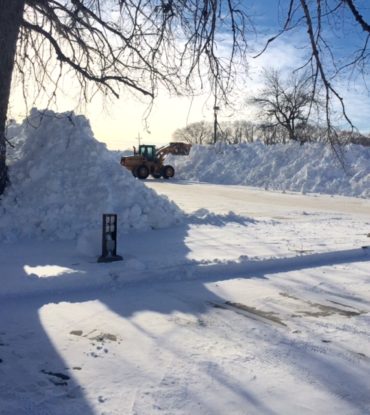“Have you entered the storehouses of the snow, Or have you seen the storehouses of the hail?”
This is my parking spot at the Life Skills and Transition Center. I remember God’s question to Job and wanted to say “yes I have.” Then I looked at the word and it can mean “treasury”. Have you entered the treasury of the snow has a different feel than storehouse for me. A treasury is a place where something valuable is kept. Looking at the context of Job 38 the idea of a treasure house of snow is that we can learn a valuable lesson in the snow itself. Scientists have remarked about the endless variety of each crystal and that none are alike. No two snowflakes are exactly the same. Like the whole of creation snow is “fearfully and wonderfully made”. Today we can make artificial snow and interestingly manmade snow has really bad looking crystals compared to the gorgeous diversity of the real stuff.
Man made
So what is the point? People who live constantly with snow realize how infinitely variable it is and it is reflected in their language. Folks who study such things have said that there is a huge number of words that the Inuit people have for snow. Some claim hundreds and it has caused a debate that has gone on for a century. “The problem is that words don’t merely match pre-existing things in the world. Rather, they shape and encapsulate ideas about things–how they are categorized (compare dog vs. canine), how we are interacting with them (compare sheep vs. mutton), how the word functions grammatically (compare the noun cow vs. the adjective bovine), and how we wish to represent our attitudes about them (compare critter vs. varmint). It was in connection with this point that discussion of Eskimo words for snow first arose (in the writings of two major 20th Century anthropological linguists, Franz Boas and Benjamin Lee Whorf). Unfortunately, their point has been pretty much missed by those who insist on counting.” (From Lexemes referring to snow and snow-related notions in Steven A. Jacobson’s (1984) Yup’ik Eskimo dictionary – by Anthony C. Woodbury , University of Texas at Austin July 1991
You might also want to look at the new definition of “snowflake” as related to college students today in any urban dictionary.
We search for words to describe things that we see and understand and we really struggle with things that are beyond us. Paul in Romans says, “Oh, the depth of the riches of the wisdom and knowledge of God! How unsearchable his judgments, and his paths beyond tracing out!
So what is the point? Well when it comes to really huge stuff like the universe – Job 38:31 or small stuff like snowflakes, God is God and you are not.
Or as Matthew Henry wrote in his commentary – For the humbling of Job, God here shows him his ignorance, even concerning the earth and the sea. As we cannot find fault with God’s work, so we need not fear concerning it. The works of his providence, as well as the work of creation, never can be broken; and the work of redemption is no less firm, of which Christ himself is both the Foundation and the Corner-stone. The church stands as firm as the earth.




